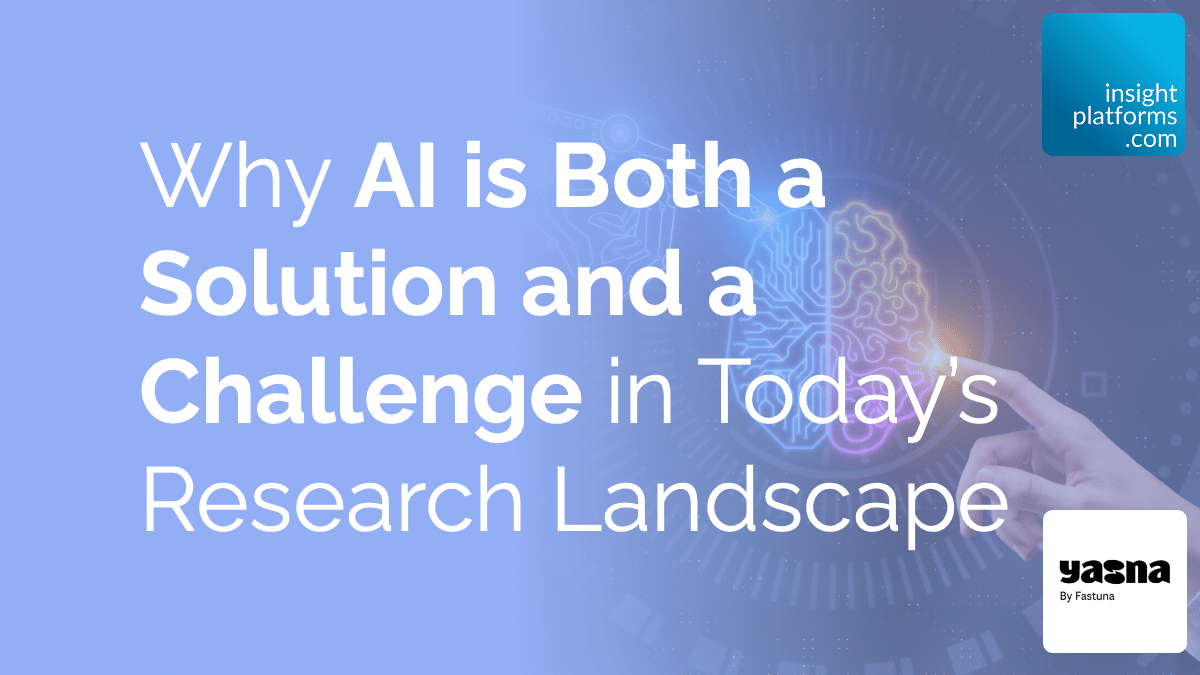
Why AI is Both a Solution and a Challenge in Today’s Research Landscape
- article
- AI
- Conversational AI
- Generative AI
Expectations for market research have shifted dramatically. Clients now demand results that are faster, more cost-effective, yet also deeper and richer. They seek insights from real-world behaviors and emotional reactions in real-time, moving beyond standardized methods: clients blend traditional methods with innovative ones, that is, they strive to add something new and interesting while still cherishing the tried-and-true approaches. This creates a paradox: achieving simplicity and speed without sacrificing depth and insight is a major challenge.
AI: The Solution Meets Emotional Barriers
AI in market research appears tailor-made to meet these demands for speed and scale. However, its relative novelty triggers significant fear and discomfort. The thought, “What if it goes wrong?” is powerful, especially in risk-averse business environments. Decision-makers often retreat to familiar, traditional methods despite recognizing AI’s potential. There’s a clear gap between theoretical excitement (e.g., presenting AI-powered market research tools like Yasna.ai to innovation boards) and the perceived safety of using them in live projects.
Not-So-Silent Blockers: Compliance, Norms, and Skeptical Stakeholders
Beyond overt fear, subtler obstacles lurk. Highly regulated sectors (finance, pharma, tobacco) face strict compliance rules on data collection, respondent recontact, and personal information storage. These issues, sometimes unmentioned initially, can halt adoption later (e.g., conflicts over data anonymity or recontact restrictions). Resistance can also be highly personal: a single skeptical stakeholder, worried about AI not perfectly following guides or lacking specific questioning styles, can pause an entire team’s enthusiasm. Winning their trust is difficult without dedicated testing time they rarely have.
AI’s Strengths: Global Reach, Consistency, and Respondent Comfort
Despite challenges, AI-powered market research tools offer compelling solutions. For global studies, they eliminate the need for local moderators and translators, enabling instant interviews in native languages with structured, comparable insights. AI provides unmatched consistency – it doesn’t get tired, distracted, or emotionally involved, ensuring uniform quality, especially in large-scale or sensitive projects (e.g., health, body image). Respondents often feel more comfortable sharing honestly with AI, free from perceived judgment.
Flexibility and Data Quality: Key Advantages
In B2B market research, AI tools offer crucial flexibility. Busy professionals (doctors, engineers) can participate on their own schedules. Respondents often appreciate the format for its speed, lack of small talk, and perceived honesty. From a data perspective, responses tend to be cleaner and more insightful – people speak freely without social filters. AI’s probing capability reduces vague answers, and structured outputs (summaries, topic organization, quotes) make analysis significantly easier than sifting through raw transcripts. In this regard, one noteable ability of Yasna.ai is adapting its language for B2B audiences. It can fluently switch to the appropriate jargon, whether engaging doctors, architects, or IT engineers.
Knowing the Right Tool for the Job (and Its Limits)
AI in market research isn’t a universal solution. Simple concept testing might only need a survey; very small or hard-to-reach audiences may require traditional methods. Human moderators still excel at picking up subtle cues, deep improvisation, and managing group dynamics. The power of AI-powered market research tools lies in the middle ground: testing raw ideas, exploring attitudes, behaviors, and emotions at scale, complementing quant and qual methods. They are capable of handling complex studies with detailed journeys and conditional logic, debunking the myth that AI is only for simple tasks.
Conclusion: Scaling Quality in the Face of Skepticism
The core challenge is emotional: overcoming fear and skepticism to leverage AI’s potential. While barriers like compliance and individual resistance are real, the pressure for fast, deep, scalable market research is undeniable. AI in market research offers a path to “scaled quality” – having more meaningful conversations with more people in less time, freeing researchers for higher-level analysis. It complements human skills and opens new avenues. For teams under pressure, AI market research tools are becoming not just helpful, but essential, despite the understandable concerns that need to be addressed.


